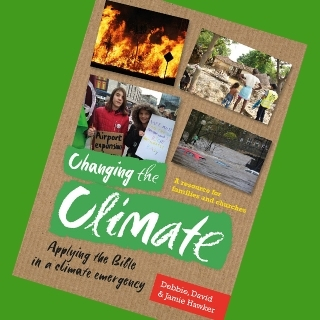In the latest of our series of articles on environmental issues and the climate emergency, Jamie Hawker explains his passion for action…
11 July 2021
Why I care so much
I first learned about climate change at school when I was around nine. I learned about the science of it all – how the ice caps were melting, temperatures were rising and weather was becoming more extreme. I knew it was a problem, but I didn’t do anything about it for the next couple of years.
In 2018, aged eleven, I heard that if global carbon emissions weren’t reduced by 2030, climate change was likely to cause irreversible damage to the Earth. When I heard this, it became the first time I considered climate change a major issue.
The reason I care so much about stopping climate change is that I don’t want a world badly changed by it. It’s not a myth. There’s evidence it’s really happening. The world will go into a kind of dystopia if we do nothing.
‘I don’t want a world badly changed by climate change. It’s not a myth. It’s really happening.’
Extreme weather
First, the weather will become more extreme. Thunderstorms will become more common, massive and violent. There will be more droughts and heatwaves, which could lead to water shortages. And the world’s temperature will increase, changing lifestyles. A UK summer could become more like an African one. And an African one may be too hot to live in, forcing people to move away from the heat, overcrowding other places around the globe.
Plants will be unable to grow and animals’ habitats will have changed. Their food might be unavailable and places might become too hot to live in, destroying lovely wildlife. Deadly animals like mosquitoes will be able to survive in more places.
‘Climate change will wipe a lot of the beauty from the world.’
What I did next
Back to my story. Over the next year, I started taking action. I joined the Youth Green Agents of Change group. We have meetings about tackling climate change. I also ate less red meat – though I didn’t eat much to begin with. I did the odd talk about climate change at church. I tried to encourage a couple of my friends to take some small action. But the most major thing I did was to stop flying.
My parents’ mission work took us abroad a lot of the time. As a child, I had travelled by plane to many different countries. I enjoyed the experience of going on a plane, and I do miss flying. But fighting climate change has to come first. We have been abroad since I stopped flying. We went by train to the south of France. It didn’t take quite as long as you might think. It’s really not hard.
Worse than Covid!
In 2019, climate change was big news. Many activists rose up and tried to make governments act on it. They inspired me to keep going. Unfortunately, world leaders and politicians, on the whole, weren’t – and still aren’t – so concerned. They have targets to take action on it by 2050, but the research is clear – that will be 20 years too late.
When Covid-19 was kicking off in the UK in March 2020, I got asked how I could care about climate change when there was a pandemic. I knew the answer, but at the time I couldn’t quite form it into words. Now I can.
‘There is no vaccine for climate change.’
Climate change is worse than Covid. While there are now quite a few vaccines for Covid, there is no vaccine for climate change. Covid doesn’t make the weather worse. It doesn’t kill plants and animals and force them out of their natural habitats. Even more than that, climate change might be able to create other pandemics that could be much worse than Covid. In fact, Covid itself may have been caused by climate change.
While I hate Covid, lockdown, mask wearing and social distancing as much as anyone, one of the few good things that has come from the past 15 months is that less travelling has meant less flying, which has a big impact on reducing carbon emissions. However, they didn’t stop; they just reduced. Climate change could still become irreversible by 2030, so we shouldn’t stop taking action.
Read and take action
In 2020, my parents and I decided to do what we could to persuade people to act to reduce carbon emissions. We agreed to write a book together showing what the Bible says about creation care, and what the science is showing us, and what we can do to help prevent the worst effects from happening.
I wrote most of my part of the book during the first lockdown. In eleven of the twelve chapters, I write twelve ‘Jamie’s tips’ for how to tackle climate change. That means there are 132 things you can do.
Many young people are frustrated with the church, because they think the church is not doing enough about climate change. Our book can help people in churches to act and to engage with issues that young people feel strongly about – while giving biblical reasons for doing so.
‘Many young people think the church is not doing enough about climate change.’
Writing the book is the biggest thing I’ve done yet in the fight against climate change – including my vow to stop flying.
I hope that you will read our book. But even more so, I hope that you will read it and then take action, based on all the tips I came up with.

Jamie Hawker, 14, is a Green Agent of Change with the Methodist Church. He is the co-author, together with his mum and dad, of Changing the Climate.

Changing the Climate
A resource for families and churches
A series of Bible passages unpacked to show the Bible’s relevance to environmentalism, and how we can all play our part in limiting the negative effects of climate change.
Jamie's tips
Changing the Climate contains 132 ‘Jamie’s tips’. Here are six of them:
- The people who suffer most from the effects of climate change generally live in poor countries. Pray for these people.
- Research some of the island nations that are under threat of going under water.
- Read more Bible passages about creation. Job 39 is a good place to start.
- Stop polluting the sea. Avoid products containing microbeads, tiny plastic particles that are a growing source of ocean pollution, killing animals. Avoid products with polyethylene or polypropylene on the ingredients list.
- Try to go for a week without buying anything apart from necessities, such as meals. If a week seems easy, try a month.
- Use the carbon calculator at climatestewards.org/offset to estimate your carbon emissions for the past year. Work out ways to reduce this.
